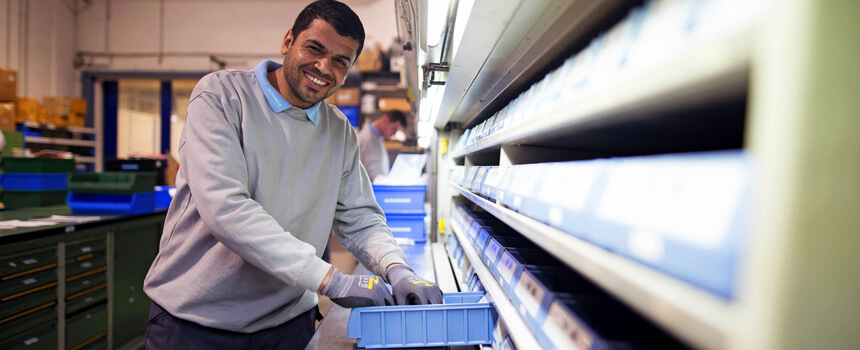 A chance of employment
A chance of employment
Access to work and education for refugees in Germany
In Syria, Walid worked as a painter to earn a living. When the war broke out in his homeland, Walid fled to Germany. Now he lives in Berlin and urgently wants to build a new life. Of course, this also includes resuming his profession as soon as possible. Walid quickly notices, however, that the job market in Germany functions quite differently. In Syria he only had to go to a suitable company, introduce himself and would get the job after a short getting-to-know period. Here, he has no idea where or how to begin. In Germany he needs a curriculum vitae, a cover letter and has to get through a job interview. Walid also has to do this in a new language. Above all, the special requirements by the authorities are a great challenge and many companies may have reservations about him. Application trainings and special offerings are meant to give people like Walid a chance and allow him to (re-)start a professional career.
Necessity
Integration of refugees into German society by entering into employment or education.
Activity
Application trainings together with volunteers, including preparation for job interviews and job placements for refugees.
Countable effort
Number of application trainings, including one-on-one coaching sessions, as well as successful placement in a job or further education programme.
Result
Workshops/trainings teach job application skills, including the necessary documents, resulting in successful entry into employment/education programmes.
Systemic effect
Successful integration and self-determined social participation of refugees as a result of employment.
Background
Since 2015, over 1,4 million people have fled war and persecution to Germany (BAMF, 2018). These people bring with them different skills and experiences. Most of them are highly motivated to work in Germany. However, many hurdles stand in their way. It is often unclear to both refugees and employers whether or to what extent they are permitted to work. Some are confused or deterred by the bureaucracy. In addition, there are linguistic and cultural barriers. As a result, fewer than 10 percent of those who have entered the country since 2015 have gained employment.
However, having a permanent job is particularly important in order to integrate into a new country. It enables a self-determined participation in society, can help to overcome traumas, frees people from forced inactivity and accelerates the learning of the language. On the other hand, German society also benefits when refugees are employed: It helps to counteract the shortage of skilled workers to some extent. Furthermore, the refugees bring diversity into German companies and they can thus be an enrichment at both a human and a professional level.
The good deed
Your donation makes it possible to hold application trainings for refugees in Germany, where they create application documents in together with volunteers and send them to individually preselected potential employers. The jobs4refugees team prepares the applicants for the subsequent job interviews. The organisation connects refugees and employers and supports both sides during the entire recruitment process as well as after the successful entry into employment. Thus Walid and many other refugees do not have to face this challenge by themselves and have a true chance finding employment in Germany.

AboutGermany
Berlin
Capital
82 521 653
Number of inhabitants
46.136
Gross domestic product per capita per year
5
Human Development Index
Of all EU countries, Germany has taken in the most refugees that have come to Europe since 2015.
About the organization and further information
Association
jobs4refugees gUG
Website
Initiative Transparente Zivilgesellschaft




